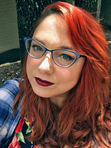Banned Books Month Guest Post from Lorrie Sprecher: Want to Read Harry Potter in Arabic in Israel?
I’m currently doing research for a novel that will primarily take place in the West Bank of Palestine, so for banned books month, I’d like to talk about Israel. As a Jew with ties to Israel, I know this is a touchy subject. I am not suggesting that Israel is any worse than Hamas or the Palestinian Authority when it comes to banning reading material. But of course, like the United States, Israel calls itself a democracy.
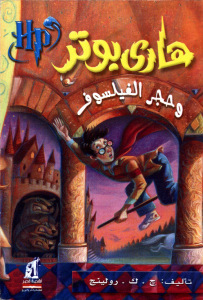
Nahdet Misr Publishing Group, Fourth Edition, January 2008.
Inside Israel, books originating in Lebanon and Syria have been banned since 1939, before Israel was a state. It is a mandate-era ordinance from the First World War. According to Adalah, the Legal Center for Arab Minority Rights in Israel, eighty percent of the books used by the Arab-speaking population in Israel come from publishing houses in Lebanon and Syria. Banned books include Harry Potter and Shakespeare. Many books of classical and modern Arabic literature, in Arabic, are only published in Lebanon and Syria, including the work of Mahmoud Darwish. Within the Arab world, only Syrian publishing houses publish Arabic translations of Hebrew literature, including the works of Amos Oz. Lebanon is the only country with publishers that translate children’s literature from English into Arabic.
In 2008, the owner of Kull Shay, the largest supplier of Arabic language books in Israel, received a letter from the Ministry of Industry, Trade and Labor telling him that, under the Trade with the Enemy Ordinance of 1939, his license to import books published in an “enemy state” would not be renewed, even if he gets these book from other countries. Kull Shay has been importing books from Egypt for thirty years and Jordan for fifteen. Many of the books were published in Lebanon and Syria, but before 2008, this wasn’t a problem, and Kull Shay had the consent of the government censor. In a 2013 report, the Mossawa Center, an advocacy group for Arab citizens of Israel, notes that Israeli customs authorities held up a new version of a seminal work on Jewish thought because it violated the law regarding trade with the enemy. This Arabic language edition was printed in Beirut. The book was by Yehuda Halevi, a Spanish Jewish poet and philosopher who died in 1141. These are ongoing problems.
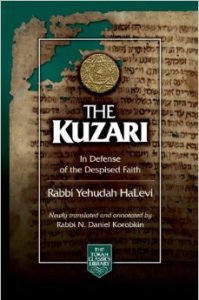
Feldheim Pub, Reprint Edition, August 2013.
In 2009, Israel’s Ministry of Education ordered the word “nakba” removed from a school textbook for Arab children. “Nakba” is the Arabic word for “catastrophe” and refers to Israeli independence in 1948 when 700,000 Palestinians were forced to flee their homes. Prime Minister Netanyahu has argued that using the word “nakba” is the same as spreading propaganda against Israel.
According to Max Blumenthal in GOLIATH: Life and Loathing in Greater Israel, applications to work in the Arab sector’s school system are read by a Shin Bet officer (an officer of Israel’s security agency) working inside the Ministry of Education, and teachers face punishment for contradicting the official Zionist narrative of independence. “To ensure total compliance with the state’s educational agenda, the Shin Bet operates a network of collaborators and informants in Arab schools, just as it does throughout Palestinian Israeli society.”
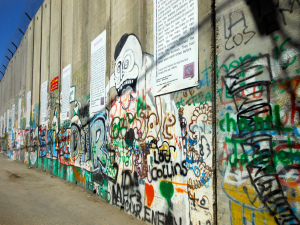
The Wall Museum.
In 2007, as Israel’s Minister of Education, Yuli Tamir, a liberal member of the Labor Party, approved a textbook for Arab children, which described Israel’s War of Independence as the nakba. The Arabic version of the textbooks for a third-grade course, LIVING TOGETHER IN ISRAEL: Textbook for Homeland, Society and Citizenship, contains the controversial line: “The Arabs call the war ‘nakba,’ a war of disaster and loss, while the Jews call it ‘The War of Independence.’” This is the only mention of the word “nakba” in any Israeli Arabic primary school textbook.
The text includes this description of that time: “Some of the Arab residents were forced to leave their homes and some were expelled, and they became refugees in the neighboring Arab countries. Some of them became refugees and were forced to move to other Arab communities in the State of Israel, because their villages were destroyed during and after the war.” The text also reflects the Jewish perspective on the creation of the state, including the fact that Arab parties rejected the 1947 United Nations partition plan for Palestine while the Jews accepted it.
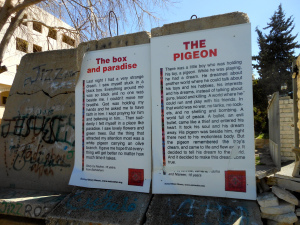
The Wall Musem.
The adoption of this textbook caused an uproar in Israel, with then Likud Party Chairman Benjamin Netanyahu saying, “I can’t remember a greater absurdity than this in a decision made by an education minister in the State of Israel.” Yuli Tamir defended her decision on Israeli Radio, saying that Israel contains two populations, Jewish and Arab, and that “the Arab public deserves to be allowed to express its feelings.”
Most Arab and Jewish children study separately in segregated schools. The Hebrew version of the textbook does not contain the Palestinian version of the events of 1948. Jewish third-graders were considered too young to deal with conflicting narratives.
When Benjamin Netanyahu returned as Prime Minister, all copies of a high-school textbook, NATIONALISM: Building a State in the Middle East, were confiscated. It contained a reference to the Palestinian historian Walid Khalidi and said that some Palestinians “contended” that the 1948 expulsions were a form of “ethnic cleansing.” The Netanyahu government has also sought to criminalize public observances of the nakba.
The “Nakba Law” of 2011 authorizes the Finance Minister to withhold funding to institutions that commemorate Israeli independence as a day of mourning. In 2014, Netanyahu’s cabinet approved fourteen principles for a new nation-state bill. This proposed bill would change the “Jewish and democratic” definition of the state by subordinating the democratic component, making it secondary to the Jewish component. It states that the right to national self-determination in Israel belongs exclusively to the Jewish people. The enactment of this law could be used to justify widespread discrimination against Arab citizens of Israel.
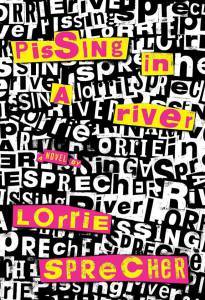
The Feminist Press, June 2014.
Since I’m talking about the holy land, I’ll say that when it comes to banning books, people generally go with the Garden-of-Eden principle: knowledge is evil. Adam and Eve eat from the Tree of the Knowledge of Good and Evil and are kicked out of the garden. Here in America, Chelsea Manning, Edward Snowden, and the contributors to Wikileaks have all eaten from the fruit of the forbidden tree. Chelsea was kicked to jail, and now faces possible solitary confinement, and Edward was kicked all the way to Russia. We try to silence narratives based on things actually happening in the world, while we champion narratives that ignore other people’s experiences and actual events. Look at the Republican Party’s narratives on rape and climate change. And let’s not talk about teaching creationism in public schools.
Because we know each other by our stories, I’d like to mention the Wall Museum on Israel’s West Bank barrier (“the separation wall,” “the apartheid wall”) in Bethlehem. Israel has constructed a barrier separating Israel from the West Bank. The Arab Educational Institute has made posters of stories written by Palestinians and placed these on the wall. Currently there are one hundred stories written by Palestinian women and young people documenting life under occupation. You can read these stories in photographs on the AEI site: http://www.aeicenter.org.
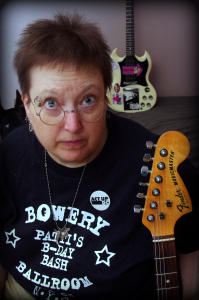
Lorrie Sprecher.
Lorrie Sprecher is the author PISSING IN A RIVER (The Feminist Press, 2014), SISTER SAFETY PIN (Firebrand, 1994) and ANXIETY ATTACK (Violet Ink, 1992). She was a member of ACT UP/DC and has Ph.D. in English and American literature from the University of Maryland, College Park. She is also a musician and her song “It’s a Heteronormative World, No!” by her band Sugar Rat appears on a compilation put out by Riot Grrrl Berlin. She resides in Syracuse with her lovely dog Kurt.






